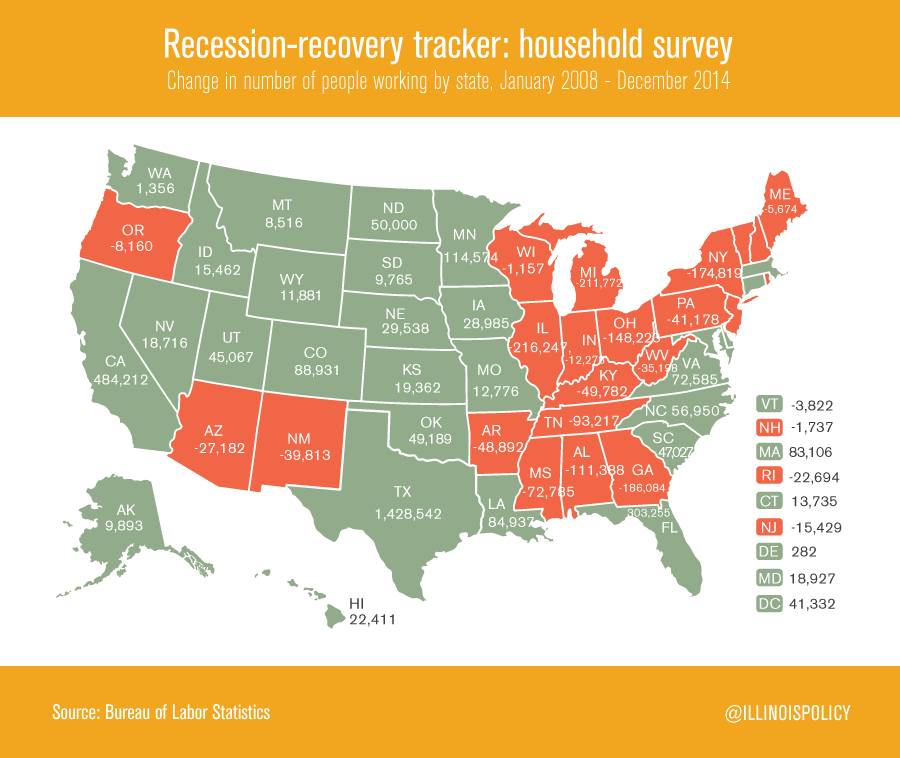Rauner’s budget defunds cronyism, embraces growth
The governor’s agenda should be cause for optimism across the state: competitiveness, not cronyism, is the right path forward to spark an Illinois comeback.
Gov. Bruce Rauner’s budget address highlighted an important point: No matter what your politics, Illinois’ problems can’t be solved without substantially better economic growth. In his address, he proposed to solve the growth problem by ending cronyism, which he plans to accomplish by defunding the Department of Commerce and Economic Opportunity, or DCEO, and enacting real reform to the state’s regulatory system.
“If we don’t take action now to expand the economic pie, the people of Illinois will be left fighting for smaller and smaller slices,” Rauner stated in his address. This line encapsulates Illinois’ economic crisis. With the economic pie in Illinois growing so slowly, Illinoisans are being left with smaller and smaller slices.
Consider the following:
- Illinois has done worse than any other state in putting people back to work since the Great Recession, according to the Bureau of Labor Statistics.
- Illinois had an all-time record number of households enrolled in the Supplemental Nutrition Assistance Program, commonly known as food stamps, in December 2014, according to the Illinois Department of Human Services.
- Illinois experienced an all-time record exodus of people from July 2013-July 2014, with 95,000 more people moving out of Illinois than moving in, according to the U.S. Census Bureau.
- Illinois’ poverty rate is at a high not seen since 1960, according to the Heartland Alliance’s Social Impact Research Center.
The first point regarding Illinois’ employment recovery shows the overwhelming problem that drives Illinois’ out-migration crisis and rising poverty. Illinoisans have been short on opportunity for decades, and simply aren’t able to find work. Illinois’ workforce is still years away from clawing back to 2008 employment levels.
Thankfully, Rauner’s budget proposal turns away from the growth-through-cronyism approach by cutting state funding to the DCEO by $185 million. The DCEO, which was infamously used by former Gov. Pat Quinn to hand out millions in grants and tax incentives running up to the November elections, is used to hand out tax breaks and other gifts to businesses. In addition, four special state tourism funds are consolidated into one within the DCEO.
When judging the department by its results, Rauner is absolutely correct in defunding the DCEO. After doling out nearly $1 billion in Economic Development for a Growing Economy tax credits over the past 13 years, the state is actually down more than 150,000 payroll jobs, a stunning record of failure.
Instead of cronyism, the governor proposed real reform. Tax reform to sunset the 2011 tax hikes will provide $4 billion in direct stimulus to the Illinois economy through income-tax relief. The governor’s other proposals included high-impact reforms to Illinois’ regulatory system, such as reforms to tort liabilities (ranked 46th most competitive nationally), workers compensation (ranked 45th), and unemployment insurance (ranked 38th). These reforms will add billions more in direct business stimulus, and provide an across-the-board incentive for businesses to hire and expand.
Rauner also referenced the state’s stifling red tape, and there’s plenty that needs to be cut. A legislative agenda for entrepreneurs will make it much easier for startups to get off the ground, while a package of local economic reforms can make Illinois communities dramatically more competitive.
The governor’s agenda should be cause for optimism across the state: competitiveness, not cronyism, is the right path forward to spark an Illinois comeback.

